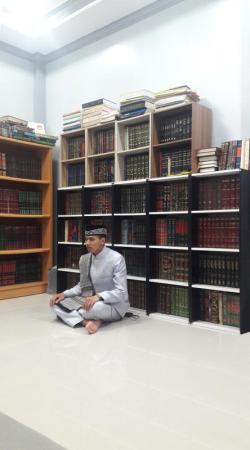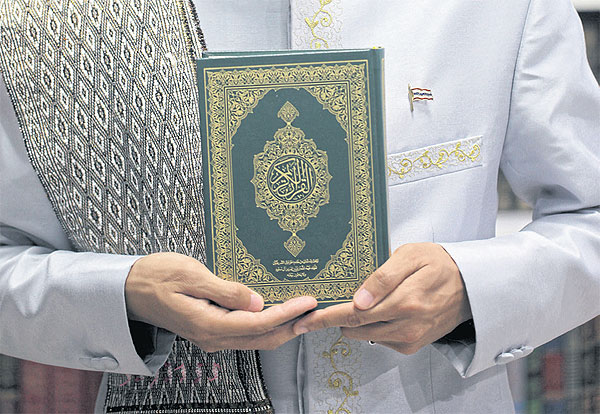In January, Hasan Samoh became the first Thai to win first place at a major Koran recital competition, taking place in the capital of Sudan where he outscored 85 other contestants from around the world. Living in Pattani, young Hasan became a celebrity in the predominantly Muslim South and, upon his return, was welcomed at Government House by Prime Minister Prayuth Chan-o-cha, who pledged to support the 19-year-old in future competitions.
Hasan, however, is a Thai who doesn't speak Thai. He's not fluent in jawi, the Malayu tongue of the South, either. His first language, one he has spoken all his life, is Arabic.
"I'm learning Thai and jawi," says Hasan in Arabic. "My plan is to become a teacher of Arabic. That's what I want to do for society."
Vidoe by Jetjaras Na Ranong.
In addition to his victory in Sudan, in which he beat contestants from Muslim countries such as Algeria, Kuwait, Bangladesh and Yemen, Hasan represents a demographic phenomenon largely unknown to people outside the Deep South: Hasan's family is one of a large number of Thai diaspora who have settled down in Saudi Arabia after completing their studies or Haj. Hasan was born and raised in Mecca and Medina, the two holiest cities in the Islamic faith. His father, Ali Samoh, was also born, raised and completed his doctorate in Islamic studies in Saudi Arabia.
It started with Ali's father, or Hasan's grandfather. He was a native of Narathiwat province who went to study in Mecca half-a-century ago, travelling by boat in a long sea journey. Once in Arabia he married a Thai woman from the South, who was also studying there, and they adopted Saudi as their new home. Ali was born there, and he, too, married a Thai Muslim from Pattani who had moved to Saudi Arabia. Hasan is their eldest son.

Hasan Samoh Photo: Kong Rithdee
At the suggestion of a friend, Ali moved back to Pattani with his family five years ago to teach Islamic studies at Prince of Songkhla University, Pattani Campus. Since his return, Hasan has been studying at Chongraksat Wittaya, a Pattani school that conducts classes in jawi and Arabic. In the competition in Khartoum, the capital of Sudan, Hasan represented Thailand after having won the local Koran recital contest.
The teenager now understands some Thai, more jawi, though both father and son are most comfortable with Arabic. In our interview at their home in Pattani, we speak to Hasan and Ali through an interpreter, Asman Taeali, who is also a lecturer at Prince of Songkhla University.
"Reporters in Sudan were shocked when I was announced the winner," says Hasan. "They didn't expect someone from Thailand to win. Second place was an Algerian girl, followed by contestants from Kuwait, Bangladesh and Saudi Arabia."
The Khartoum International Koran Award is one of many tournaments held in the Middle East and North Africa. At the heart of such a contest is the search for a perfect hafiz, or person who can memorise the entire Koran. A hafiz is someone who can recite any part of the holy book by heart, in a sonorous melody, with grammatical precision and faultless pronunciation.
Hasan said that in the first round, he was asked to recite half-a-page of the Koran. He passed, and in the next round a panel of judges scored each contestant based on memorisation, voice, syntax and ability to describe the meaning and context of chosen verses. Hasan got 99.3 out of 100 -- a narrow win, since second place got 99.1.
"He started learning when he was eight years old, and could memorise the whole book by 13," says Ali of Hasan. "His first teacher was a Pakistani, then he studied with a Nigerian. But when he kept getting low rankings -- two years ago, he placed 9th at a contest in Dubai -- we found a website that offered intensive coaching. Even reciting the al-Fatihah [the first and most basic chapter of the Koran known by every Muslim] Hasan made 10 mistakes according to the online master. From there he kept improving and finally won the big prize."
His style of recital is classical, with a deep tone, guttural control and an emphasis on vocal accuracy over drama -- a contrast from the style preferred by reciters schooled in Thai Islamic schools, who often use complicated, singsong melodies and modulating pitches.
To Hasan, memorising and reciting the Koran is a way to "strengthen his faith". It also trains him to be a soothing, calm person. Ali also believes that the practice improves the capacity of his son's memory, meaning Hasan can do well in other subjects too.
Returning to Thailand five years ago, Ali and Hasan didn't feel discouraged by the situation in the Deep South. In fact, they had longed to come back from Saudi Arabia. Ali has since he was a student wanted to come back to his family's homeland to teach Arabic, and though he got an offer from universities in Medina and Kuala Lumpur, he decided to come to Pattani.
"It wasn't easy settling in," says Hasan, with a sentiment echoed by his father. "Everything is different here -- the food, the language, the people. In Saudi, we eat roti and curry. Here we have khao yam [the southern rice dish]. But now it's all OK."
Ali says that the bonds he's developed with other Thais who have settled in Saudi Arabia is deep. He once proposed to Thai authorities to set up a school for Thai children in Saudi to teach them their native language, or at least a long-distance class to familiarise them with Thai language and culture. That way, the adjustment required would be minimal if they decided to come back.
Informal statistics from the Royal Thai Consulate in Jeddah show there are 8,000-10,000 Thais who have settled in Saudi Arabia. The earliest wave, including Hasan's grandfather, was in the 1960s when Thai students and Haj pilgrims arrived in Mecca and Medina before returning home. Most of these are ethnic Malay Thai from the Deep South, again like Hasan's grandfather. Some of them have citizenship but most hold resident permits.
Before the diplomatic rift in 1989, there were 300,000 Thai workers in Saudi Arabia. After relations between the two countries became strained, the number declined drastically to an estimated 10,000. Most Thais who arrive these days are students from the Deep South on a scholarship to study in Mecca, Medina or Riyadh.
Hasan, too, is waiting to continue his studies. Finishing secondary school this year, he expects to get into a university in Medina, like Ali, his father. Then he'll decide if he'll return to live in Pattani.
"Let's see how it goes from there," he says. "I like it here now."

Hasan Samoh is a hafiz who can recite the entire Koran.

